The recent 21th National Assembly Election showed changes in that 57 women candidates were elected out of total of 300 seats. This marked the highest female candidates compared to previous elections regardless of the fact in an objective sense, only 19 percent of women comprise the National Assembly. Moreover, the rise of youth politicians was a noticeable change. The older generations seemed to accept changes in the age range in politicians as many agendas regarding the matter of youth were greatly dealt with in many parties. However, this was proved as only a superficial movement, as only 13 youth candidates were eventually elected as lawmakers. Word such as cheongnyeon-pali did not come out of the blue as it refers to how the youth are being used merely as a tactic to gain votes. Such subtle exclusions of the youth are considered problematic in current Korean politics. Though the progress is gradual, young politicians, university students, and some in the older generation are striving to hear the youth’s say in politics. Ewha Voice interviewed such groups that are making efforts to make the youth become leading members in the Korean society.
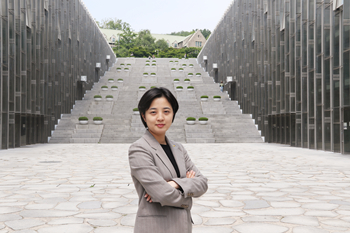
How Ryu Ho-jeong became the youngest lawmaker in the 21st National Assembly
Ryu Ho-jeong, a 27-year-old proportional representative from the Justice Party became the youngest female lawmaker in the 21st National Assembly. Only 13 lawmakers in their 20s and 30s were elected as lawmakers which makes Ryu’s accomplishment as the youngest female member an unprecedented one. When asked how she was able to be given the first position as a proportional representative in the Justice Party, she replied that it was possible through Youth Quota System in the Justice Party. As it was mandatory to organize the 20 percent of the candidate list with those under 35, Ryu was given the opportunity to be a forefront candidate.
Ryu majored in sociology at Ewha starting from 2011. Her interest in games led her to become a member of Klass Ewha, an e-sports club. She also served as a Department of Sociology co-representative in her junior year. It was after when she graduated that her interest in unjust labor environments ignited, especially in the IT industry. When she started working at Smilegate in 2015, she worked for excessive hours without additional pay. Ryu once worked up to maximum 96 hours a week as a game developer. Due to the inclusive wage system, many game-industry workers’ labors were used for granted without receiving reasonable payment. It was on April 2018, when she made the first union in the game industry and pursued better welfare for workers. However, due to her actions she received a resignation under instruction. As Ryu participated in numerous assemblies as the head of the union, she felt the urge to be the person who can participate in enacting laws on behalf of the workers out there that are suffering.
This idea was the driving force to her avid participation in the Justice Party where she worked to represent the rights of women and IT laborers. Her interest in these groups could also be seen in her election promises as her top priorities were to eradicate inclusive wage system and to encourage paternity leave.
“Inclusive wage system is used as an expedient in companies to exploit workers without giving them fair wages,” Ryu said. “Therefore, it is necessary to eradicate this unjust law so that workers can demand better treatment.”
On the notion of paternity leave, Ryu emphasized how the law is not prevalently used in workplaces.
“I wanted to ask other female developers in the industry about the treatment they would like to receive, but I could not do so because there were no female personnel left after giving birth,” Ryu commented. “For women to work continuously, help from husbands is needed. Unfortunately, the Korean society does not have an environment where men can use paternity leave freely without worrying about coming back to work.”
Lawmaker Ryu first stepped into the National Assembly on Feb. 2, and gave her press conference on May 31. Still at the start as a lawmaker, she believes that her age and gender will make a difference.
“Currently, the average age of the lawmakers is 54.9 years old, whereas I am 27,” Ryu noted. “Therefore, the issues I am interested in and am willing to change will naturally be related to the youth. I believe merely doing my work will bring about change that is different to what the older generation lawmakers are determined to change.”
Ryu is optimistic about the youth’s participation in politics. She thinks that they are still heedful when it comes to casting votes. Although they are caught up in living life, she trusts that gradual change will be possible in one’s individual places: Ryu as a lawmaker representing youth, women, and laborers while the youth vocalize their thoughts on agendas that matter to them.
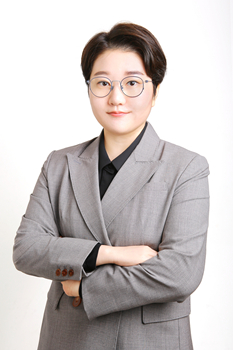
Lee Ji-won, the twenties representative of South Korea’s first-ever feminist party
A new milestone was reached for female politicians on March 8 this year, as South Korea’s first-ever feminist party was founded on International Women’s Day. The Women’s Party consists of approximately 10,000 members, of which three-quarters are in their 20s. Ewha Voice interviewed Ewha Womans University alumni, and the twenties representative of the party, Lee Ji-won.
Lee graduated with a bachelor’s degree in Women’s Studies and Political Science. She states that studying these majors put her on the path to become a female politician.
“In Ewha all leaders were women,” Lee said. “But outside, although women constitute half the world, we are constantly underestimated. It is exceptionally difficult for female politicians to rise high in ranks when working in male-dominated circles. I wanted to not only change this very solid male centered structure, but also create a political arena where women could unite. I joined hands with countless women identifying themselves as feminists and engaged in various projects to denounce misogyny.”
Lee learned of the Women’s Party at her graduate school and joined immediately to reflect the agendas she had accumulated from countless powerful women. Soon she became the co-chairmen, and ran as the first candidate of the Women’s Party in the 21st National Assembly election.
Lee has a long career of fighting to improve women’s rights. She’s currently a research member of the National Solidarity against Sexual Exploitation of Women and a professional teacher at the Korean Institute for Gender Equality Promotion and Education. In the past she helped analyze domestic violence as research assistant in the Ministry of Gender Equality and Family, as well as assisting to develop textbooks in Korean Women’s Development Institute. Her works didn’t stop here.
In 2018, Lee worked in a project to eradicate digital sex crimes, called “SYSTEM.” While engaging in this project, she reported the sexual exploitation of children and adolescents on Twitter to the police, as well as blocking crime paths so that women would no longer enter into digital-based sexual exploitation.
“With the help of women, the Nth Room was finally publicized, and only now has the very organized culture of sexual exploitation surfaced.” Lee said. “Digital sexual exploitation has not only occurred recently. This proves that the Korean society has tolerated sexual exploitation of women. To overcome this, my pledge was to enact a special law on digital sex crimes and abolish the subsidy limit for victims.”
She also shared her own experiences as a female politician. She stated the most difficult part was continuously being subject to misogyny throughout her campaign. On her first offline election campaign, a group of men threw rocks at her at Hongdae Station. A few days later, there was an incident where a man verbally harassed her, asking her if she could “sell her body for the country.”
“Despite these incidents, thanks to the support of all the women, I was able to finish my campaign on a joyful note,” Lee said. “The last day of my campaign was the most meaningful. I visited Nowon Station near Yongwha Girls’ High School, to emphasize that it has been two years since the nationwide School Me Too began, the starting point being this very high school. I received several hand-written letters from female teenagers who wrote that the meaning of establishing the Women’s Party is to resist against fundamental evil. I was deeply touched by the sincerity they showed to improve women’s rights, and once again realized that female politics is a massive project for the future generation.”
Lee stated that she has been in the scene of violence and discrimination for the past nine years. Her determination to not lose or give up on a single woman kept her going. She admitted that there are still many obstacles we must overcome to achieve gender equality but hoped women will always be able to encourage and support each other so that no power is lost along the way.
The youth and the older generation’s efforts on creating politics together
As important as young politicians is the youth’s attitude towards politics. In the modern society, many students are rightfully interested in learning, studying, and portraying politics in a more familiar perspective. Ewha Voice interviewed Jinsunminguk Mock Assembly, a school club engaging in play production based on weekly political seminars. Park Jin-hee, screenwriting leader of Jinsunminguk, and sophomore student from the Department of Political Science & International Relations, shared her experiences in Jinsunminguk and her thoughts on youth’s political attitude.
“Most club members probably felt attracted to Jinsunminguk because it allows us to portray our political stories into an engaging play,” Park said. “We previously dealt with various topics including gender quotas, labor and society, and human rights of youth. Last year we put on a play titled Where did the Children Go? which covered the suffrage rights of 18-year olds. It was a political hot potato but proved to be exceptionally meaningful, as the actual election age was lowered in the 2020 general elections after our play last September.”
She also explained her thoughts on the current elected members of parliament. Park emphasized her positivity towards the increased percentage of female members.
“More female members will keep the older generation of male politicians on their toes, as well as opening opportunities for the younger generation and female politicians to raise their voices.”
Park added that as a female, a minority, and a social underdog, she felt strongly about preventive policies. She expressed her hopes for policies to be created before the harm has been done, instead of the typical order of new policies following crimes against minorities. Furthermore, policies which are unable to embrace and express the quickly developing modern society should either be disposed of or altered. She was hopeful that university students studying the society at the border between the new and old generation, will provide insight for this change.
“It’s crucial that when students study politics, they should be aware of both progressives and conservatives,” Park added. “Students are contrasted with the older generation by being ‘young’ and are often titled as being ‘progressive’. In order to become the true leaders of society, it’s essential that we engage in discussions with a neutral and unbiased perspective. There’s nothing more dangerous than pre-deciding what’s ‘incorrect’ when discussing politics.”
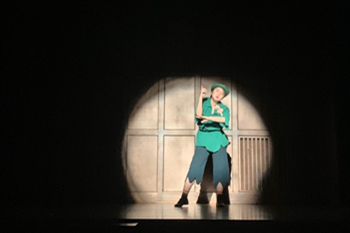
With 18-year olds earning suffrage, there has been a rising interest in relationships between youths and politics. Especially the media’s role in portraying the youth’s position in Korean politics were the key point in the “The Youth and 2020 General Election” seminar on May 22. It was co-hosted by the Korea Communication Association and the Korea Press Foundation.
In the seminar, presentations from professors were followed by panels who debated on the direction politics which include youth should take. Professor Kim Ji-won from Dankook University presented her analysis on 3,701 news articles through website Bigkinds from 1990 to 2020. Kim saw an increase in articles which used words such as 18-year-old, freshmen, and suffrage from 2017. However, she noted the media’s problem in how it frames the youth.
“The media is framing the youth as an age group that needs protection and guidance with the use of words like student and school in portraying them,” Kim said. “There were mainly articles which explained the significance of 18-year-old suffrage one-month before and after the 21st general election. Unfortunately, there were not many articles that had a broader take on the direction of the youth suffrage after the election.”
One of the panels Yoon Hyeong-joong, a policy researcher from LAB 2050, also mentioned the need to shed light on youth agendas so as to stop the youth from being used as a mere material for politicians to get votes.
“Mostly the media either views the youth as pitiful or disgraceful,” Yoon said. “In order to give the youth to vocalize their needs and to give them the power to do so, it is necessary that we discuss more on the media’s role in the portrayal of the young.”
Cho So-dam, the CEO of Dotface explained her thoughts on unreliable internet communities and young politicians in general. Cho realized many young people receive information on politics through not the news, but community websites and reply sections. She believes it is important to restrict such junk news from giving the youth negative impressions of politics and politicians with groundless comments. Cho also expressed bitterness when she saw how hard it was for the youth to become a cohesive age group.
“The youth are more individualistic than the older generation,” Cho said. “This means that many of them have different political values that cannot be grouped. “Even a person from the minority group can support the views in terms of a woman, but not as a member of the queer community. Such individualism is dividing youth politics which is already an incohesive group.”
Lee Gi-sang, a journalist from Korea JoongAng Daily stated that she views youth not as a group to educate but a group who is already interested in politics in their own way.
“When the agenda resonates with them, they engage in politics as well as anyone,” Lee said. “Their passionate voices regarding the Nth Room incident and college entrance exams prove this. Society shouldn’t necessarily try to force students to be political activists but create agendas that they can more relate to.
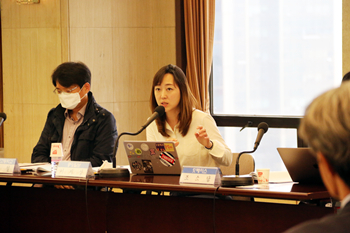
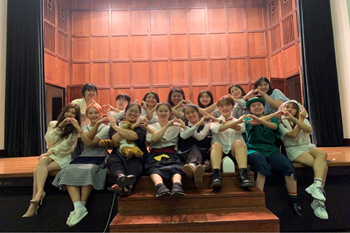
Speaking of the need for change in politics
Records have been broken as 57 female politicians were elected in the 21st National Assembly. However, the percentage of female parliament members still remains at the bottom amongst OECD countries. Furthermore, only 13 elected members were of generation 2030, which is three percent of the parliament, whereas they account for 28 percent of the entire population.
“The faces of the 21st National Assembly hasn’t changed much from last year,” said parliament member Ryu Ho-jeong. “Although there have been small changes, the average parliament member is still a man in his fifties. Youth politicians may not be the cure for all political problems, but more diversity will certainly help.”
Ryu also expressed hopes for youth to participate more actively in politics.
“I think youth definitely engages in politics when times are dire, but it isn’t enough. We don’t live in a society that can be changed by one or two members of parliament. Youth needs to be more concerned about politics and raise their voices to generate further positive change.”
Lee Ji-won emphasized that she hopes women do not hesitate or feel ashamed to approach or want power. She strongly believes that the solidarity of women can change the history of male dominance so deeply rooted in society.
“The percentage of women in the 21st National Assembly has only increased by two percent compared to the 20th. Promoting the training of young female politicians, and implementing a 30 percent quota for female lawmakers at the National Assembly may be a solution.”

